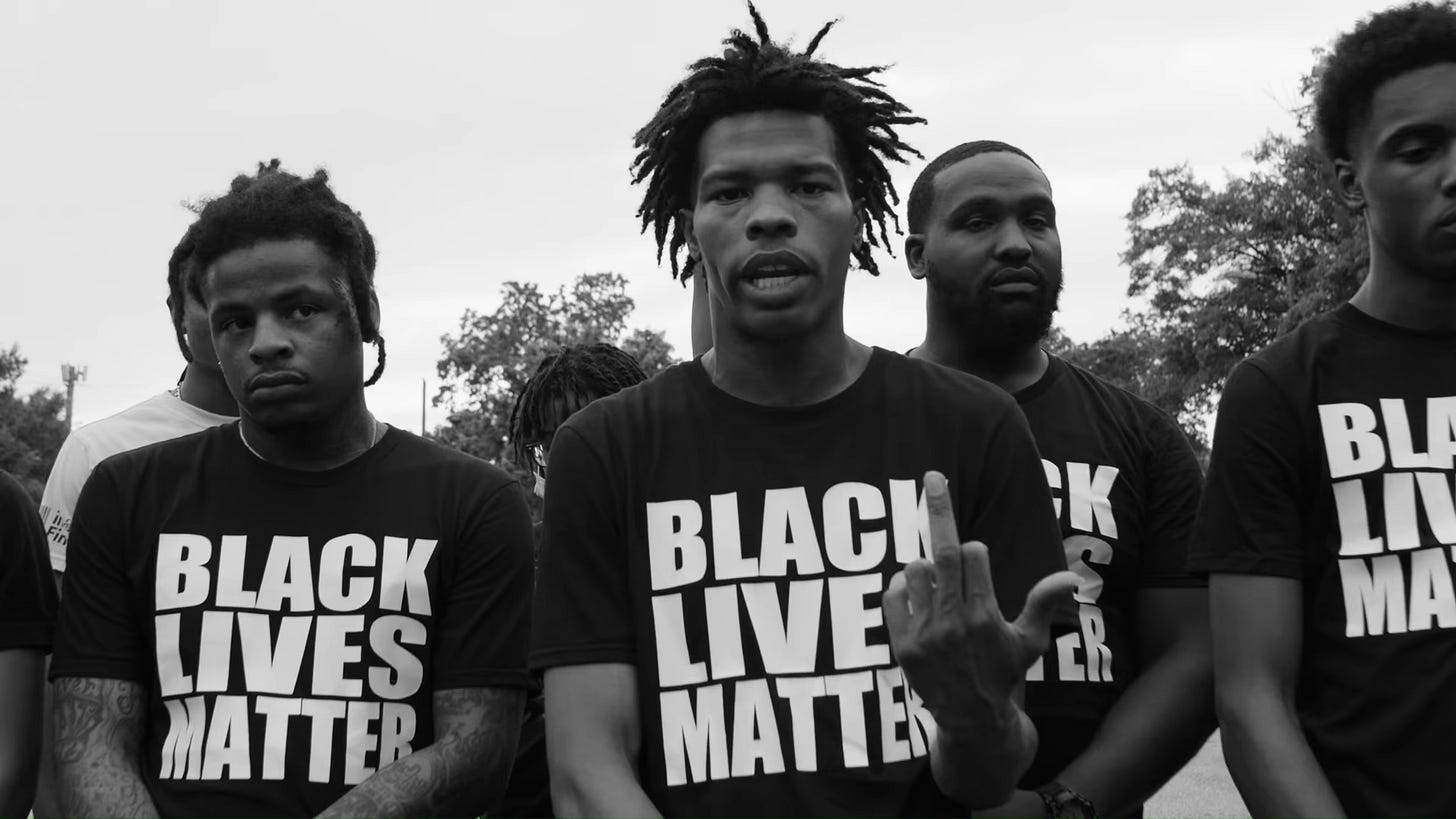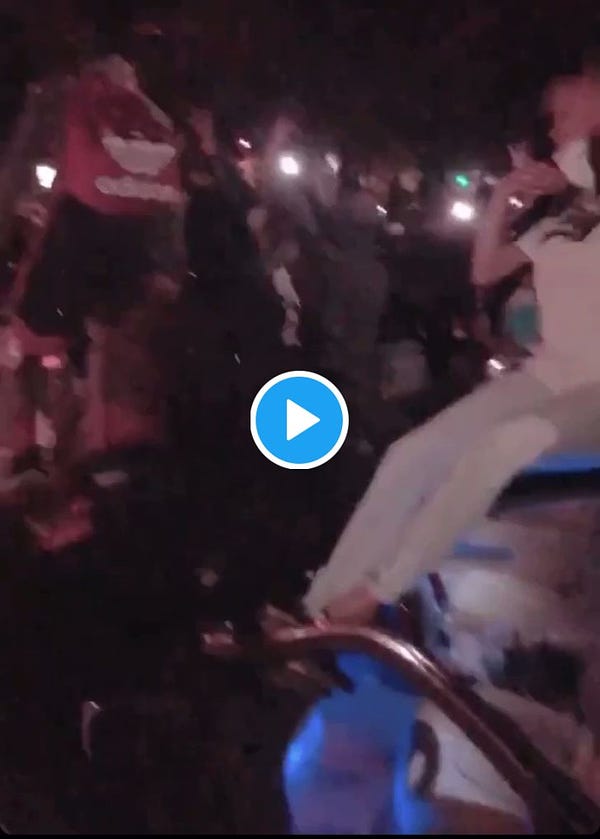
Nina Simone famously declared that “artists should reflect the times.” So many people perceive that quote as a statement solely about creating work with pro-Black or anti-establishment themes. But she gave more context within that interview:
“We don’t know anything about ourselves. We don’t even have the pride and dignity of the African people. We can’t even talk about where we came from. We don’t know. It’s like a lost race. And my songs are deliberately to provoke this feeling of like ‘who am I and where did I come from? Do I really like me, and why do I like me? And, if I am Black and beautiful, I really am and I know it, and I don’t care who cares/says what.’ That’s what my songs are about, and it is addressed to Black people.”
Reflecting the times isn’t just about railing at the establishment or affirming our beauty in spite of it. Black people are a politicized group; all of our expression is political. As long as the white supremacist capitalist patriarchy (© bell hooks) reigns, so much of our experience — and our expression — is shaped by how we engage with it.
Black artists, especially hip-hop artists, inherently contribute to the “lost race” dialogue through our curiosities, self-hate, despair, and defiance. Simone concluded, “how can you be an artist and not reflect the times?” Whether an artist is saying “we gon’ be alright” or “Perky’s Calling,” they’re reflecting our moment.
Noname recently criticized the political silence of nameless “top-selling rappers” whose “whole discographies be about Black plight” in a since-deleted tweet. Many Twitter users challenged her, co-opting her observation as the basis to shield Cole and Kendrick from criticism. They surmised that their work so expertly reflects “Black plight” that they’re above criticism for their lack of social agency or tonedeaf songs like “Snow On Tha Bluff."
But if Good Kid Maad City is revered for its commentary on gang violence, how can Lil Baby’s discography, which presents a firsthand perspective of the same social decay, not also be an expression of Black plight? J. Cole’s 1985 was lauded by his fans as an insightful portrait of the toll that drugs are taking on American youth. Is Future’s entire discography not also a commentary on America’s drug epidemic from an “insider’s” perspective?
It’s time to dismantle the construct of “socially conscious” rap, which has been shaped by the white establishment. The white gaze shouldn’t frame our perception of Black music’s “political” value. But Black people conditioned to pursue proximity to whiteness subscribe to their terms, policing Black artists with a eurocentric lens on a daily basis.
One is likely to mention museum exhibits, college syllabi, and rancor of public officials when validating a work’s political merit. But the prison industrial complex is one of the biggest travails of our lifetime; is it not a political statement that so many incarcerated people identify with the Lox or Mozzy as artists who tell their story? Is an entitled, controlling Drake record not a commentary on cishet mens’ perpetually jumbled gender politics? The bevy of women who feel empowered by Young MA or Megan Thee Stallion challenging gender roles don’t seem to garner those artists near the respect of Kendrick Lamar’s musical militance; perhaps because patriarchy doesn’t respect women enough to recognize their power.
While Future or Lil Baby’s expressions have a slim shot at garnering a Pulitzer, Kendrick and J. Cole have received numerous accouterments of the establishment for their social awareness. The disparity demonstrates that palatability is the major factor that separates what’s labeled as “socially conscious” from what’s popularly devalued. “Socially conscious” artists present a voyeuristic lens of societal ills for ivory tower intellectuals who desire a distant, zoological sample of the experience. But giving esteemed podiums to artists who are still in the trenches of woe is an immediate reflection of the failure, or more aptly, the efficacy, of white supremacy.
Hip-hop’s political utility has been framed by its engagement with white institutions since its inception. N.W.A. became known as the world’s most dangerous group once the F.B.I. sent them a letter in response to their iconic “Fuck Tha Police” song. Ice Cube has noted that while they’re deemed godfathers of gangsta rap, and credited for the political power of “Fuck Tha Police,” that wasn’t their branding. They initially called themselves “reality rappers” — it just so happened their reality was a social epidemic.
Ice T and his Body Count band’s “Cop Killer” song also garnered headlines in 1992. He insisted that the record was a commentary on police brutality, but mainstream media framed it as pro-cop murder. Politicians, including then-Vice President Dan Quayle, stumped until the record was pulled from shelves by Time Warner, the parent label of Ice T’s Warner Bros. Records. But there was no national referendum over 1988’s “Colors,” his sonic snapshot of gang life. There was no press conference or filibuster to ponder what he meant by, “you wanna get rid of the gangs it's gonna take a lotta work,” and why he thought “peace is a dream, reality is a knife.”
Later that year, defense attorney Allen Tanner scapegoated Tupac’s “Soulja’s Story” while defending Ronald Ray Howard for murdering Texas Highway Patrol officer Bill Davidson. Tanner’s defense in the seemingly open-and-shut case was that the song made Howard commit the shooting, having previously said that, “I was kind of fascinated by this music that he was listening to.”
Quayle spoke out against “Soulja’s Story,” decreeing that “there is absolutely no reason for a record like this to be published by a responsible corporation.” But he didn’t consider how the corporation of America was responsible for other bars on “Soulja’s Story:” “crack done took a part of my family tree.” That admission would meander into the government’s complicity in engineering the so-called war on drugs.
The establishment’s dubiously selective lens makes them untrustworthy arbiters of what Black art has “political” merit. As Black people’s treatment by the Democratic party demonstrates, our usefulness to the American establishment often hinges on how easily we can be exploited. The same is true in our expression. They saw fit to weaponize N.W.A, Ice T, and Tupac’s statements for their own agendas, but never engaged the full scope of their records. They said it was wrong to make “Cop Killer,” but isn’t it also wrong for killer cops to push Black people to the edge?
The same self-indicting hypocrisy is true years later. In 2018, Kendrick’s DAMN won a Pulitzer Prize for music. The committee lauded the project for it’s “vernacular authenticity and rhythmic dynamism that offers affecting vignettes capturing the complexity of modern African-American life.”
But DAMN isn’t the first rap album that meets that criteria. Their explanation exposes the committee’s inexperience with hip-hop. It’s plausible that they, like award show committees and other entities of the establishment, regarded hip-hop as an inferior artform for years before Kendrick Lamar became a mainstream darling. It’s damning that the first time the Pullitzer’s recognized hip-hop was a U2-featured project that was impossible to ignore as the highest-selling album of 2017.
The ignorance makes sense, though. How could a society that mocks and criminalizes people addicted to drugs respect the social commentary of a song like Juice WRLD and Future’s “Astronauts?” Cardi B’s raps are often demeaned by men too underdeveloped to respect the legitimacy of her sexual freedom. The reductive confines of “conscious rap” reflect the willful ignorance of a system that’s being uprooted by the moment — and it’s up to artists, journalists, and fans alike to reclaim the political power of all rap.
Execution and emotional resonance are the everlasting factors of great art. Kendrick’s “Alright” is rightfully a powerful go-to song at protests, but in New York, protesters have belted Pop Smoke’s “Dior” as a rail against the NYPD who didn’t let the late rapper perform a single show in his home city before he was killed in February. They recite “Hot Nigga” not just in solidarity with Bobby Shmurda and GS9, but because it’s a feel-good song — and Black joy is revolutionary in itself. When they belt “Faneto,” it’s because the intensity that Chief Keef fed the song taps into a fury that oppressed people know too well. The political value of these songs reverberate deeper than the lyrics; they’re disparate glimpses of existence in a country predicated on Black death. Denying the value of their expression is too close to denying their existence.
The white establishment will never understand the totality of Blackness, so they’ll never understand the full scope of our expression. They’ve only engaged the bits that “fascinate” them. What about the parts that scare them, that baffle them, that make them reflective of whiteness? They’ve used their power to gatekeep an environment where the extent of Black people’s worthwhile contribution to art history is their deftness at defining white supremacy’s pain. They stood idle while the pain was inflicted, then rewarded the most noxious howls. But Black art is so much more vital than our depths.
The artists rewarded by the “socially conscious” myth don’t deserve to be on a pedestal. As Cole and Kendrick have demonstrated, artists lauded as “socially conscious” aren’t necessarily conscious of the social conditions of the people they pander to. With every artist respected equally for their projection of Blackness, there would no more elitist pedestals, no protective stan culture, and no conflation of musical content with social agency or intelligence.
This is a free newsletter. Those who wish to support can contribute here:
Venmo: Andre-Gee





Hi!
Thanks for a very interesting read! I have been pondering on the same questions as long as i've been listening to hip-hop (approx. 20+ years or so).
I quoted you in one of my blog posts on my movie blog:
https://donteventhinkitslater.blogspot.com/2020/11/wolves-2014.html
Greetings
Mr. A
I was wrestling with my thoughts with a while about this, this is a great read, thank u.
A few questions tho:
1 - are we going to bring in gay, trans and non binary rappers into the political arena of rap, or just keep ignoring them? There’s a pretty large group of those artists and I think u could make a really good unpacking of those works.
2 - is implicit political music more popular than explicit political music because it’s more respectful of its audience?
3 - did the high profile prosecutions of Ice T, NWA and Tupac put a kibosh in explicit political rap in the mainstream, or was that a wave that created and fell naturally?
4 - Where is the love for Rasheeda? Rasheeda had joints.
5 - you listened to the new Kur EP, Young 79?